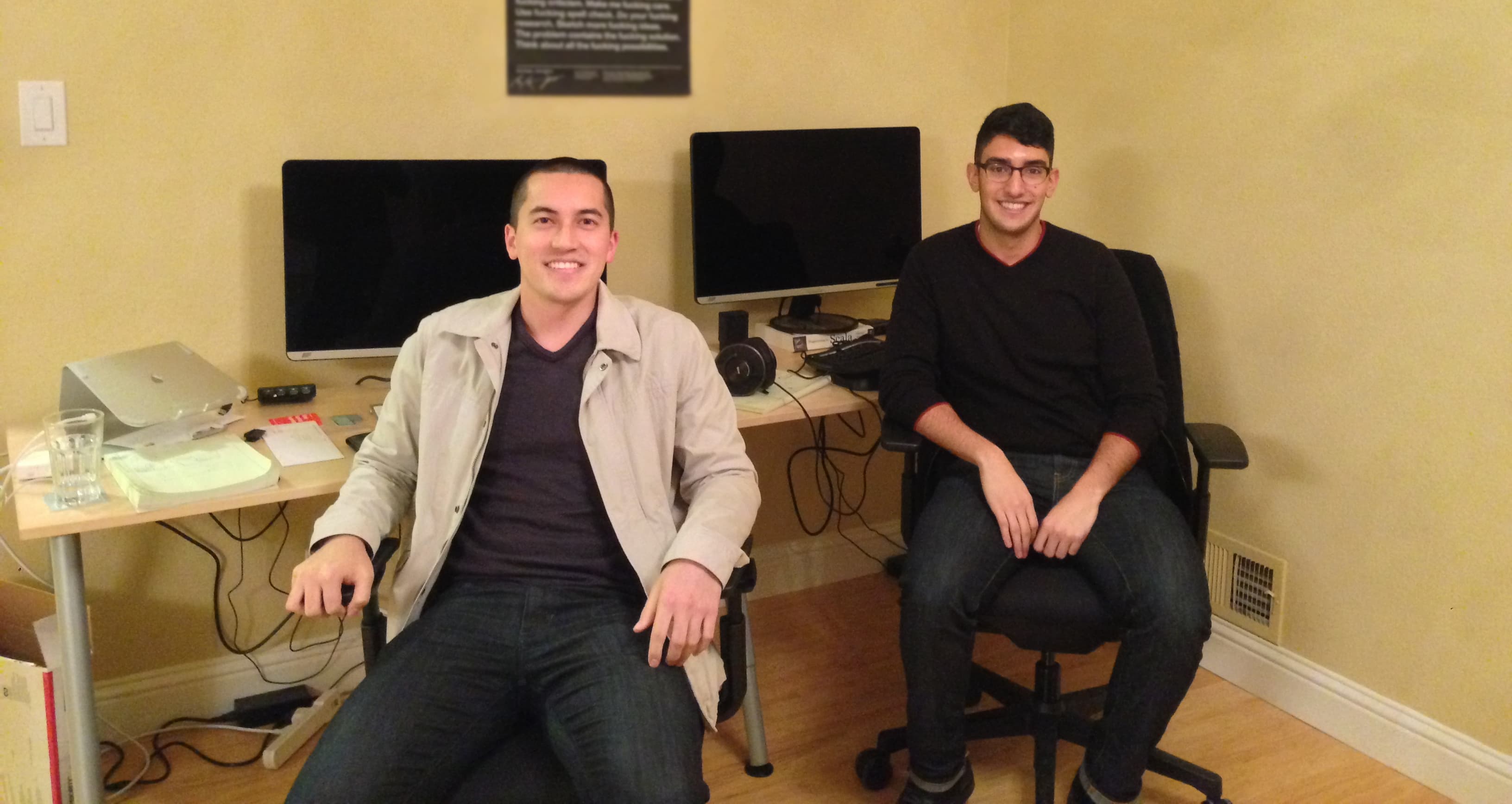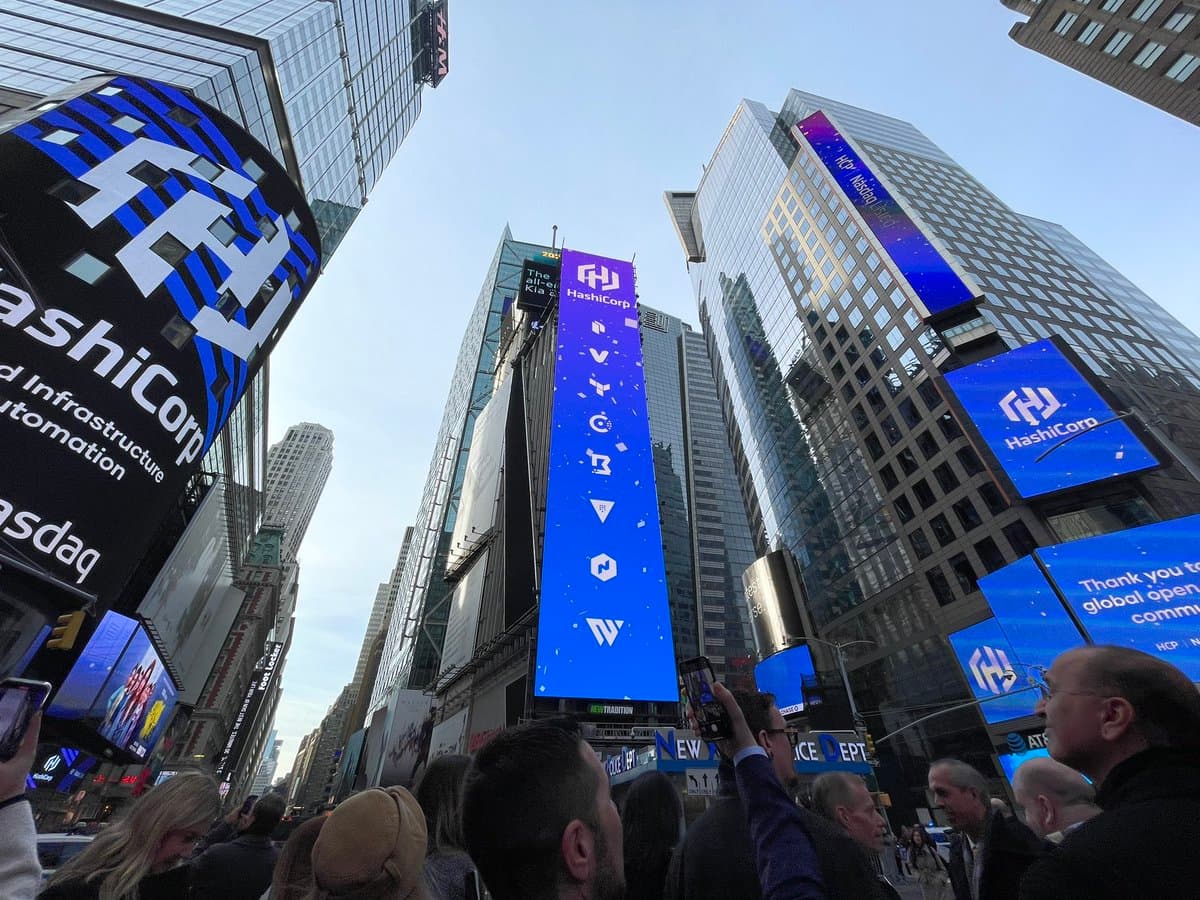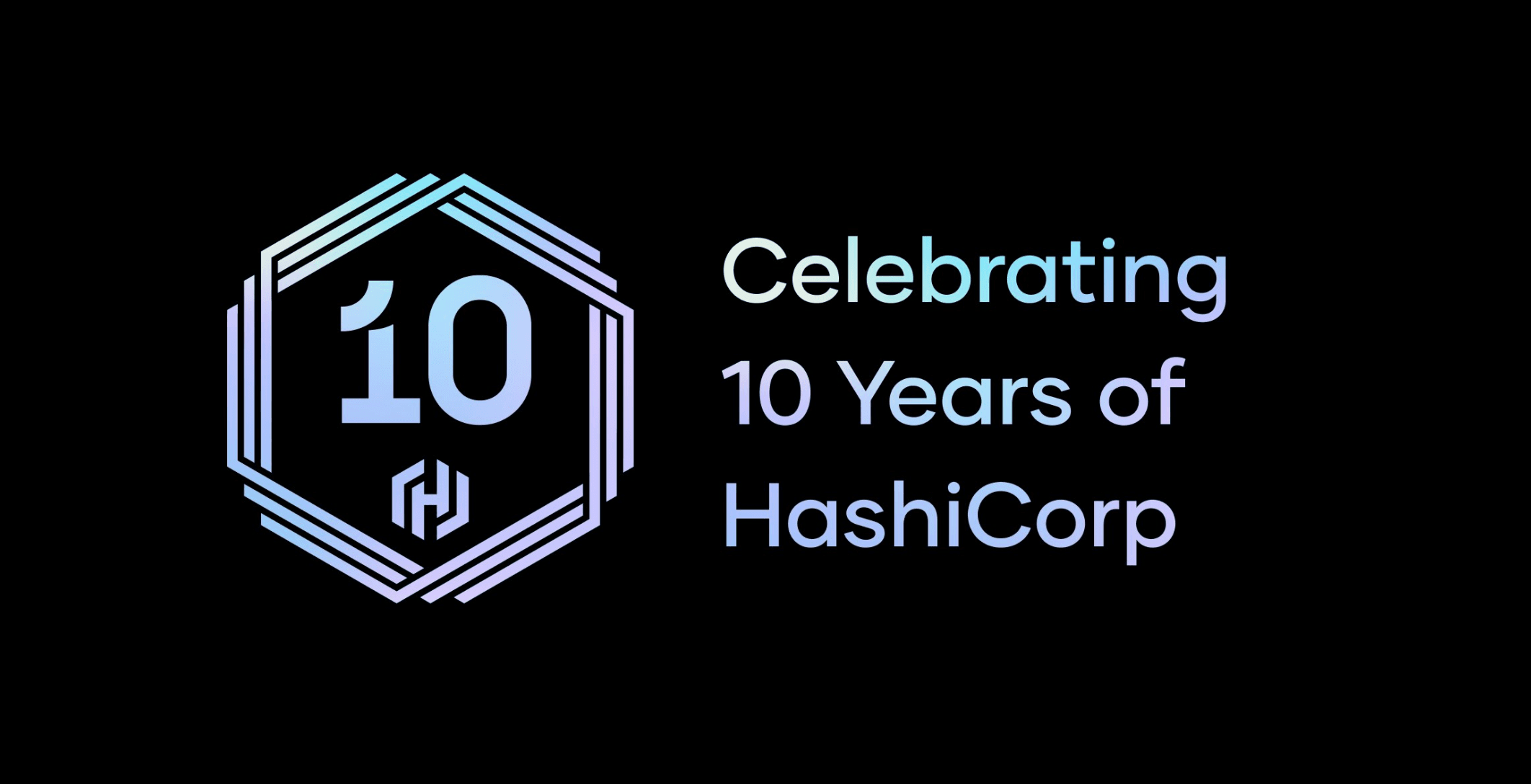The exact date of HashiCorp’s founding is a little fuzzy, so instead of pinpointing one date, we decided to celebrate our 10th anniversary (or, as we call it, Hashiversary) as a season stretching from November through December with a variety of activities and events — for our employees, our customers, and our broader community. Before that season draws to a close, we wanted to let our two co-founders, Armon Dadgar and Mitchell Hashimoto, share their perspective on the meaning of this milestone, not just for the company, but also for the industry as a whole. We wanted to know what they’ve learned along the way, what they’re most proud of, and what the future of HashiCorp looks like from their perspective.
»HashiCorp is 10 years old. Congratulations! Why is this milestone significant to you?

Mitchell and Armon in 2013.
Mitchell Hashimoto: At the beginning it felt so unlikely that it would ever reach this point. We felt early on that either this is going to fail in a few years, or it's going to be successful and go on much, much longer than that. And we got past that hump.
To me, that’s why it’s so significant. Reaching this point demonstrates the impact we've had on the industry, the success of the individual products, and the ability to build a team of people that can sustain a company this large. On the one hand, I can't believe it made it this far, and then at the same time, it’s kind of just the beginning.
»What’s your favorite HashiCorp moment from the last 10 years?
Armon Dadgar: HashiConf 2016 in Napa. That was a favorite moment because we were still very early. We had just done our Series B financing round. It was our second-ever HashiConf, and we basically took over a Napa Valley vineyard. Relative to our first HashiConf, it was a far more polished affair. We had our first set of technical decision-makers and enterprise buyers there. We had a whisky tasting and a jazz band by the pool. We felt like a real company all of a sudden, but we were still a tiny and cool, super agile start-up. That was a fun moment.
Mitchell: One was when we rented that house in Venice in 2014. It was our first time getting the people we had hired together — I think it was 12 people, maybe — in one physical location. And we rented this house in Venice, California, and we worked on our first commercial product. What was cool was that I could look around the room and see people that believe in this. People that weren't just Armon and me. Now there were actually people who believe enough to join this ragtag group in a random house in Venice and work on this idea. That was a cool moment.
»How has your vision for the company evolved over the years?
Mitchell: It's still pretty accurate, you know? Our audacious goal that we have always had for the company is to be a critical infrastructure provider for all the world's companies. Not just our customers, which are the biggest companies, or our open source consumers, which are much smaller. Our goal is to be that essential infrastructure partner and that still remains true today. In some areas we’re closer to being able to declare some level of victory. And there are other things that are brand new but we still have that ambitious goal.
»Even when companies correctly understand the market, the products, and what customers are going to need, they don’t always create a long-term future. What else do you think contributed to HashiCorp’s success over the last decade?
Mitchell: I think it starts with being early and having a controversial opinion about what the future might look like. If you're working on something that's already mainstream, someone else has been working on that for a decade and you're likely way behind. For us, the controversial thing was the timing.
Back in 2012, there were still discussions going on about whether the cloud would ever be used in the enterprise. Then we came along and said, “clouds are the future and there are going to be multiple clouds. We're going to be this layer that's going to help with that.” A lot of people were very against that. They couldn’t see that as a possible future.
The other part is acknowledging that the choice of software for this multi-cloud world would be predominantly open source-based and driven by developers. That was controversial as well. So we put those two stakes in the ground.
While there were maybe a handful of companies that picked the same bets as us, what happens after that is what we got right. Our choices around how we design our enterprise products, the specific categories that we went after around infrastructure, provisioning, and security — those sorts of things. How we treated our open source community. I think those were less controversial but still important choices that we got right to help separate us from the pack.
Armon: I think our thesis of a multi-cloud future panned out. Another thesis was that developers would be the kingmakers, and the third one was that open source was going to be the main software distribution channel. If you took those things together, then the obvious conclusion is that you should build an open source, multi-cloud management tool focused on developers. And that's what we did.
But that's not sufficient. A lot of people tried doing that. The hard part is selling it. You had to sell your product by being charismatic and convincing people that this is the right choice and combine that with being good at developer relations. We also had to have good taste in the product. We had to build good products that people liked using and then be charismatic and say, “Here, use this.” Back in the early days we spent ridiculous amounts of time on airplanes flying around convincing people that they should use our products. We really focused hard on developer relations in a very genuine way. We were all developers and authentically engaged with that audience. I think the products expressed good taste, and people genuinely liked to use them. I think you needed all three of those in addition to being right about the other bets.
A 2015 talk by Mitchell at TIAD Paris.
»What has been your biggest lesson learned over the last decade?
Mitchell: On a personal level, I came in as just an engineer, in my experience and in my worldview. I had this naive view that you build this technology that has promise, and then if it wins, you win. And it's done. That's the idea that I had.
One of the biggest lessons I've learned is how much of a machine this industry is. How hard it is to move it, and for good reason. Building the technologies is just one small part, along with all these other small parts that add up to this big machine: The importance of good messaging. The importance of a good sales and support team. The importance of sticking with customers even though it might take them years to get to the point where they can actually adopt your products. It's a long process.
My biggest lesson is that an infrastructure provider has to have staying power. I think HashiCorp has shown that as a company. A lot of startups see themselves as companies that you start, you get acquired, and then you disappear. And I think for infrastructure in particular, that really doesn't work because customers are making choices that are at least a decade, hopefully multi-decade, decisions. They want a partner that will stick with them.
»What are you most proud of from HashiCorp’s first 10 years?
Armon: I think the IPO, because it was the culmination of so many different things. It represents so many sub-milestones. It was so representative of the company ethos, from the attention to the branding of the announcement ad in the New York Times to how the animation worked on the billboard in Times Square. In every aspect of it, the attention to detail, the craftsmanship, and the ethos of the company really showed through.

Times Square in New York City on the day of HashiCorp's IPO.
If you think of everything that leads up to it, it's just a tremendous amount of work. We have to build products that are relevant, build a sales force, build a company. The IPO itself, getting the S-1 done, working with the bankers and doing the roadshow, everything. There was an incredible amount of work that went into making that moment possible. It was such a moment to celebrate and reflect on the success of the company that was created.
Mitchell: I think it’s our business model. Armon and I used to have these meetings early on where it felt like everything in the company — everything — required us. One of the things I'm proudest of is that the company has gotten to the point where so much of the company doesn't require us to be involved. There are still companies our size where every single decision is micromanaged by a founder. We never wanted to be like that. Obviously, Armon is extremely involved in a lot of decisions, but it's different. The company does run if we go on vacation. That's something I’m really proud of.
»What challenges do you foresee in the next 10 years, and how are you preparing for them?
Armon: There are always challenges. These things are never a smooth linear line.
It's impossible to prepare for the challenges of 10 years from now, but I think it goes back to asking yourself, “Do you have the right strategy?” And, more importantly, “Do you have the right people on the journey?” Because at the end of the day, you don't know what challenges you're going to face. Some of them are obvious, but most of them are not, and when you get there, it's about the team you have with you to go solve those challenges.
That's the biggest thing you do to prepare. You make sure you have the best people working with you. And then you're going to take the challenges as they come. You take it day by day, year by year, and you solve one set of challenges at a time.
I think scaling is always going to be a challenge. Hiring is a challenge. Redefining processes and culture and your systems at every scale of the business is always a challenge. Every time the company grows by 50% you break everything about your process and systems. So you're constantly reinventing as you go, and I think that will continue to be the case.
»What is your biggest hope for HashiCorp’s next 10 years?
Mitchell: In some ways, I hope the things we started with 10 years ago continue to make sense. But I also hope that over the next 10 years the company will continue to get into newer things. I hope we continue to release new products and that we establish a new worldview of what's next. I think it is important for companies to have long-term staying power, and I hope that the machine we built and the leadership we have in place mean that continues to happen. That's the most important thing. Staying true to what we've built over the past 10 years, as an infrastructure partner and as a long-term partner.
Armon: I still feel like we are a little baby company, early in our journey. I look at VMware, and in many ways it’s synonymous with an entire industry. You think virtualization, you think VMware. I think we can get to the point where if someone thinks DevOps, they think HashiCorp. That would be a cool milestone, reaching that point where we're so ubiquitous, we're so well known, that we're the default in DevOps. That would be cool.











